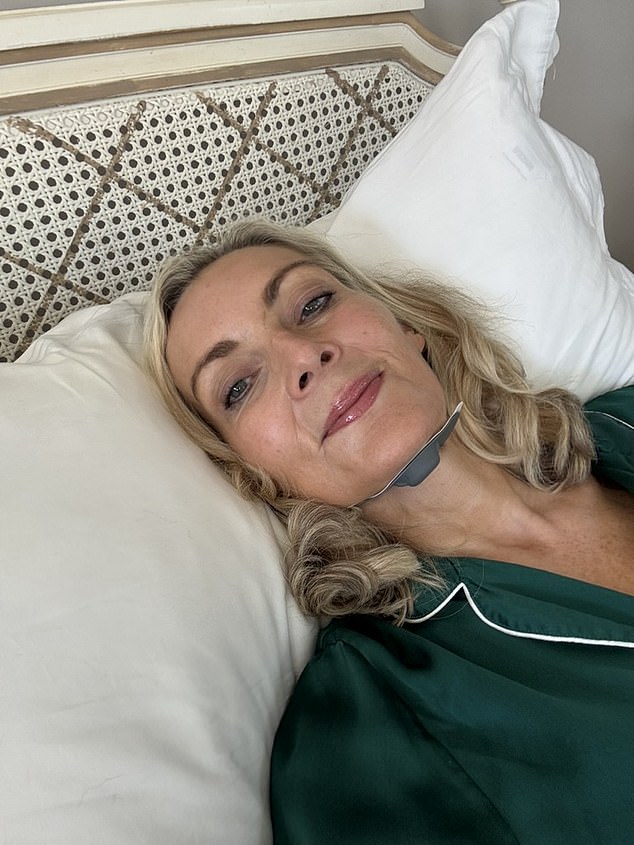For years, I’ve had my trusty lineup of sleep gadgets — earplugs, eye mask, lavender spray — you name it.
But last week, I added something new to my nighttime toolkit: a small dark-grey sticker that promised to stop me from snoring.
It’s called Zeus, a discreet, under-the-chin device that’s being hailed as a game-changer for anyone who snores — and, perhaps more importantly, for anyone sleeping beside them.
Developed by experts from Guy’s and St Thomas’ NHS Foundation Trust and King’s College London, Zeus is designed to tackle snoring without being invasive.
I was told it’s already transforming sleep for many people.
So, as someone recently told by her teenage daughter that I’ve started snoring, I decided to give it a go.
The Shocking Discovery That I Snore
This revelation came as a bit of a blow. Historically, I was the perfect roommate — silent and still, sleeping flat on my back with arms crossed like a well-behaved vampire. But recently, my sleep quality has nosedived.
I’ve been waking up suddenly, feeling exhausted, and generally struggling through the nights.
To investigate, I downloaded an app called SnoreLab, which records snoring sounds.
The results were… humbling. Apparently, I snore for about an hour each night — not horrendously, but enough to sound like a tiny truffle pig under the covers.
Mortifying! Had I been snoring for years and everyone just politely ignored it?
Why We Snore — and Why It Matters
“Snoring happens when airflow is partially blocked in the nose or throat, causing vibrations in the surrounding tissue,” explains sleep expert Dr. Neil Stanley, author of A Sleep Divorce.
He says the muscles in the throat and tongue relax too much at night, narrowing the airway.
You’re more likely to snore if you sleep on your back, drink alcohol, or carry extra weight. Ageing and menopause can also increase your chances.
And sometimes, snoring can signal something more serious — like sleep apnoea, where breathing stops and starts throughout the night.
Aside from the health concerns, snoring is a silent destroyer of relationships.
I know couples who sleep in separate rooms because of it, and one friend even calls ahead to ask hosts if there’s a “snoring room.”
It’s even been called the second most common cause of divorce in the UK — and frankly, that doesn’t surprise me at all.
The Birth of Zeus
“Traditional treatments for snoring aren’t ideal,” says Nigel Clarke, CEO of Zeus.
“Devices like CPAP masks can help but are uncomfortable and often abandoned.”
The concept behind Zeus came from doctors at Guy’s and St Thomas’.
They wanted something as effective as CPAP but less intrusive.
Clarke’s father — a self-described “mad inventor” — collaborated with them to turn that idea into reality.
After 15 years of research, they created a mini version of a TENS machine (transcutaneous electrical nerve stimulation).
You might recall TENS from labour pain management. Zeus works similarly but focuses on gently stimulating the hypoglossal nerve, which controls the tongue.
This prevents the tongue from collapsing backward and blocking the airway during sleep.
Putting Zeus to the Test
Using it is surprisingly simple. The small, flat, spaceship-shaped gadget sits on a charging pad until its blue light turns steady.
You attach a hydrogel pad underneath, then stick it under your chin and switch it on.
There are ten settings, with “one” being the least intense.
After twenty minutes — enough time to fall asleep — the device begins to pulse gently in six-second bursts with four-second pauses. The sensation is faint, almost soothing.
To my astonishment, I drifted off easily and slept for six uninterrupted hours — unheard of for someone who usually wakes if a leaf hits the window.
The next morning, the SnoreLab app showed I’d only snored for one minute instead of an hour.
I repeated the test for four nights, and the results were consistent. I woke up feeling refreshed, like I’d rediscovered proper sleep.
Real People, Real Results
I’m not a chronic snorer, so my case isn’t extreme. But for others, Zeus has been life-changing.
Take Aline Jones, a 51-year-old tech worker. “My husband had been complaining about my snoring for years,” she says.
“Nothing worked — until Zeus. Within days, the volume and frequency dropped drastically.
I feel more rested, and my husband finally sleeps through the night.”
The device has been clinically tested on patients with obstructive sleep apnoea, producing excellent results in three NHS-backed trials.
It’s now undergoing approval to be rolled out across the NHS.
The Verdict — Worth Every Penny
Zeus isn’t cheap — it costs £250 from zeussleeps.com, and you’ll need to buy replacement stickers at about £1 each.
But for many, the drug-free and non-invasive benefits make it worthwhile.
“It’s a credible solution for certain types of snoring,” Dr. Stanley says.
“But if you suspect sleep apnoea, see a GP first — and remember that lifestyle changes still matter.”
As for me? I may look utterly ridiculous with a chin gadget, earplugs, and an eye mask — not exactly bedroom glamour — but I’ll happily sacrifice vanity for uninterrupted sleep.
Besides, if anyone breaks into my house at night and sees me like that, they’ll probably run for their lives.
